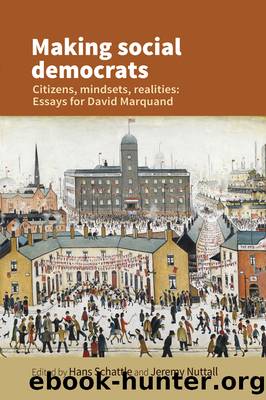Making Social Democrats: Essays for David Marquand by Hans Schattle & Jeremy Nuttall

Author:Hans Schattle & Jeremy Nuttall [Schattle, Hans & Nuttall, Jeremy]
Language: eng
Format: epub
Tags: Political Science, Comparative Politics, Political Process, Political Parties
ISBN: 9781526120304
Google: VugWtAEACAAJ
Goodreads: 39973279
Publisher: Manchester University Press
Published: 2017-12-27T10:59:46+00:00
Assessing Marquand's civic republicanism
Having traced the evolution of Marquand's civic republicanism, and identified its core elements, I now venture a preliminary assessment. In this section I note some objections before turning in the conclusion to an argument for its contemporary relevance.
One objection to Marquand's republicanism is that it is too consensualist. A related objection is that it is too perfectionistic or communitarian (to use the language of academic political theory). A further objection is that it too arduous.4 Finally, with an eye on the overarching theme of this volume, we might also ask just how robust is the connection between Marquand's civic republicanism and social democracy.
There seems to be a strong assumption in Marquand's works that the aim of deliberation is a socially agreed understanding of shared public purpose or the common good. This is an explicit assumption of The Unprincipled Society and of Mammon's Kingdom. It is, however, a recurrent criticism of conceptions of deliberative democracy that they unrealistically and dangerously focus on consensus. Agonistic democrats, such as Chantal Mouffe, also a participant in the citizenship debate of the late 1980s/early 1990s, argue that consensus is something we should be wary of, that it will reflect the suppression of real differences and conflicts of interest and perspective (Mouffe, 1988; 2005). Of course, as we have seen, Marquand also celebrates political and policy-level pluralism. But there also seems to be an expectation of some kind of a shared ethical viewpoint emerging through discussion, and there is not much, if any, consideration of how this fits or stands in tension with ethical pluralism.
Another response to ethical pluralism is the âpolitical liberalâ one of trying to detach notions of the common good, for political purposes, from wider conceptions of the good life as articulated by religious or other âcomprehensiveâ philosophical doctrines (Rawls, 1993). We have seen how Marquand seems to reject this and that his own republicanism seems, at base, to appeal to a strong conception of the good life. Some will object that makes his republicanism too strong in the claims it makes about the nature of the good life. This connects back to the objection about consensus: is it realistic or reasonable to expect wide agreement on this specific conception of the good life?
In posing such a question, we should note that the status of the good life is itself a matter of controversy within contemporary republican political theory. When Skinner and Philip Pettit started to develop their own âneo-Romanâ account of republicanism they carefully distinguished it from âneo-Athenianâ or âAristotelianâ accounts (see Pettit, 1998: 83â9, and Skinner, 2002, on how European city-state republicanism developed an intellectual grounding in Roman sources before the recovery of Aristotle's Politics). On Aristotelian accounts, the virtues of political practice in the republic are themselves integral to the good life, and the republic is justified by this connection to the good life. By contrast, on the neo-Roman view, the republic is justified as a regime for securing freedom as non-domination. This freedom is not itself
Download
This site does not store any files on its server. We only index and link to content provided by other sites. Please contact the content providers to delete copyright contents if any and email us, we'll remove relevant links or contents immediately.
The Secret History by Donna Tartt(19092)
The Social Justice Warrior Handbook by Lisa De Pasquale(12191)
Thirteen Reasons Why by Jay Asher(8912)
This Is How You Lose Her by Junot Diaz(6889)
Weapons of Math Destruction by Cathy O'Neil(6281)
Zero to One by Peter Thiel(5802)
Beartown by Fredrik Backman(5759)
The Myth of the Strong Leader by Archie Brown(5509)
The Fire Next Time by James Baldwin(5448)
How Democracies Die by Steven Levitsky & Daniel Ziblatt(5219)
Promise Me, Dad by Joe Biden(5154)
Stone's Rules by Roger Stone(5088)
A Higher Loyalty: Truth, Lies, and Leadership by James Comey(4964)
100 Deadly Skills by Clint Emerson(4927)
Rise and Kill First by Ronen Bergman(4790)
Secrecy World by Jake Bernstein(4753)
The David Icke Guide to the Global Conspiracy (and how to end it) by David Icke(4720)
The Farm by Tom Rob Smith(4514)
The Doomsday Machine by Daniel Ellsberg(4490)
